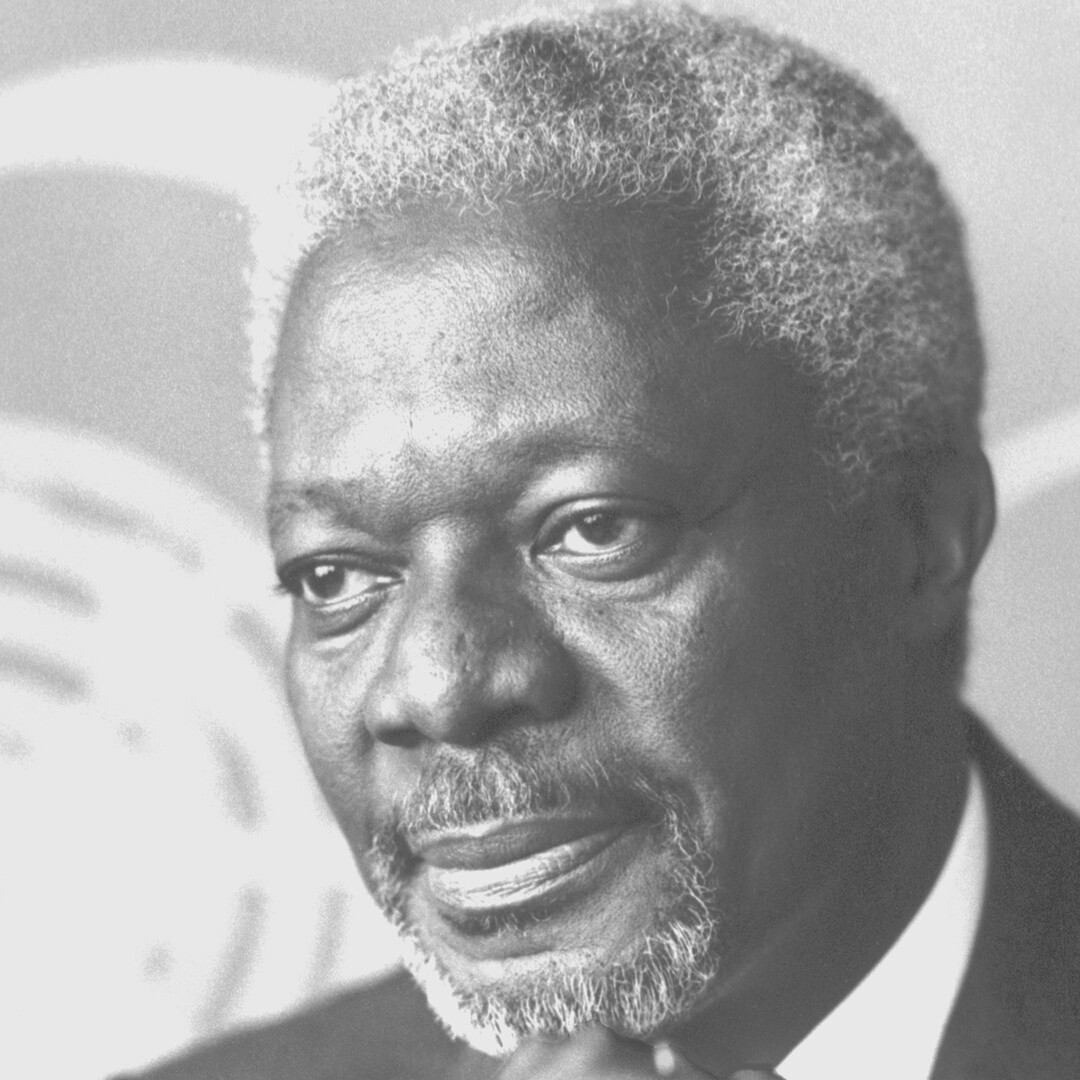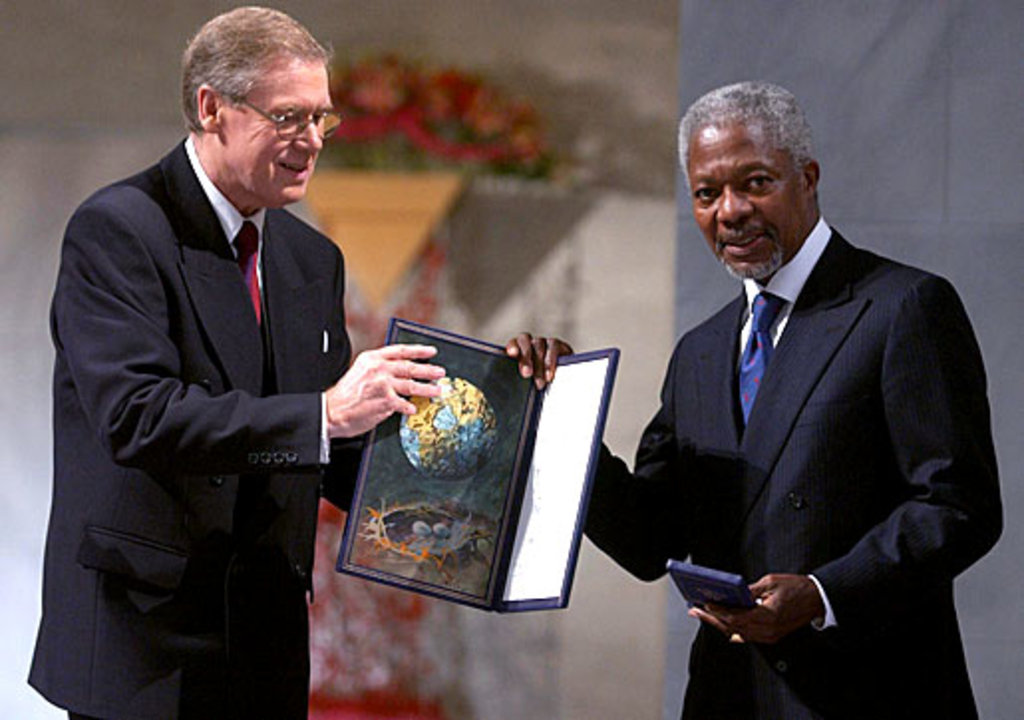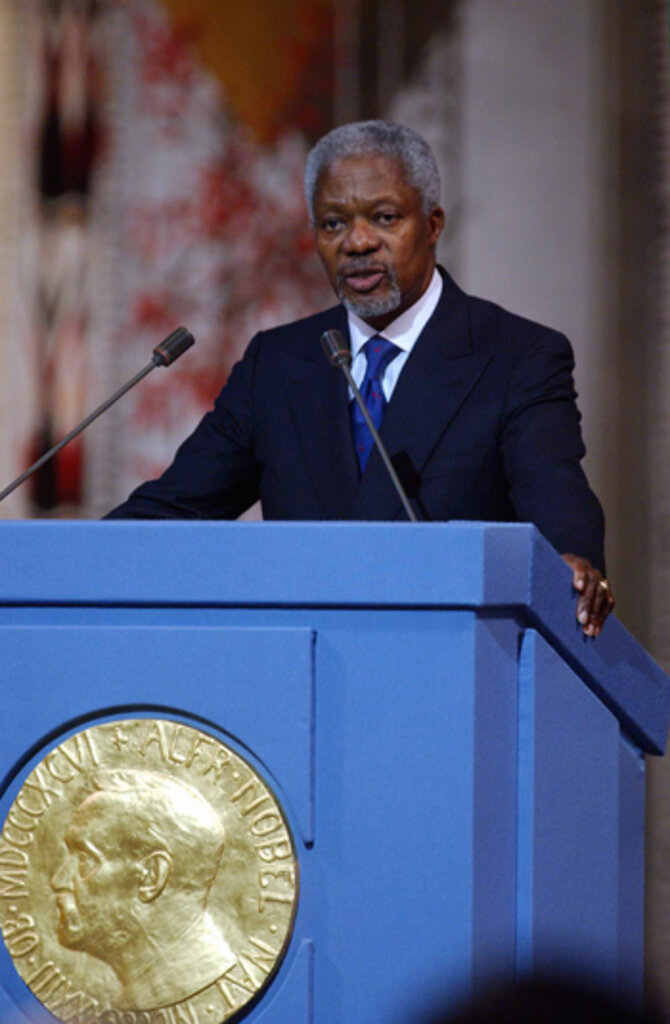Kofi Annan
Speed read
Kofi Annan was awarded the Nobel Peace Prize, jointly with the United Nations, for his work for a better organised and more peaceful world.

Full name: Kofi Atta Annan
Born: 8 April 1938, Kumasi, Gold Coast (now Ghana)
Died: 18 August 2018, Bern, Switzerland
Date awarded: 12 October 2001
Africa’s most prominent diplomat
In 2001, the centennial of the Nobel Peace Prize, the Norwegian Nobel Committee divided the prize between the United Nations (UN) and UN Secretary-General Kofi Annan. Its decision reflected a long-time practice of supporting organised cooperation between nations. Kofi Annan rose through the ranks of the UN. In 1993, he was appointed Undersecretary-General for peacekeeping operations, a position he held until 1997 when he became the seventh UN Secretary-General. Annan received the peace prize for revitalising the UN and placing priority on human rights issues. The committee also commended his efforts to stop the spread of the HIV virus and his condemnation of international terrorism.
| UN Secretary-General The top executive of the UN. Since 1945, the following have served as Secretary-General: Trygve Lie (Norway), Dag Hammarskjöld (Sweden), U-Thant (Burma), Kurt Waldheim (Austria), Javier Péres de Cuellar (Peru), Boutros Boutros-Ghali (Egypt), Kofi Annan (Ghana), Ban Ki-moon (South Korea), António Guterres, Portugal. |
"In this new century, we must start from the understanding that peace belongs not only to states or peoples, but to each and every member of those communities. The sovereignty of States must not longer be used as a shield for gross violations of human rights."
Kofi Annan, Nobel Prize lecture, 10 December 2001.

Reform-minded Kofi Annan
With the support of UN employees, Annan succeeded in making the UN more efficient and acknowledged the need for further reform within the organisation. In response, the USA paid its debt to the UN. Annan believed that the Security Council ought to have a greater number of permanent members from different parts of the world and that the UN should close its doors to undemocratic nations. These suggestions were reviewed by a commission of 16 internationally prominent persons. In December 2004, they put forth their recommendations for organisational changes within the UN.
"Mr. Annan is the best secretary-general in the history of the UN."
Richard Holbrooke, BBC News, 28 June 2001.
Kofi Annan – admired by many
Kofi Annan’s ability to criticise his own actions was a sign of his good leadership skills. Former Prime Minister of Norway and WHO Director-General Gro Harlem Bruntland characterised him as a person who possesses “a tremendous power of persuasion.” Others were impressed by his “warmth and charm,” or described him as “gentle, yet effective.” In the autumn of 2001, Saudi Arabian terrorist Osama Bin Laden criticised Annan harshly. He called the peace laureate a “criminal” for his participation in the effort to gain East Timor’s independence from the Muslim world with the help of Australian “crusaders.”
| WHO World Health Organisation. The UN specialised organisation responsible for health issues. Founded in 1948. Its goal is to promote the best possible health for the world’s population. Headquartered in Geneva. |
"No one has done more than Kofi Annan to revitalize the UN."
Gunnar Berge, Presentation Speech, 10 December 2001.
Kofi Annan’s vision for the future
In his Nobel Prize lecture, Annan formulated three key priorities for the UN for the future: eradicating poverty, preventing conflict, and promoting democracy. He gave the following grounds for the priorities: “Only in a world that is rid of poverty can all men and women make the most of their abilities. Only where individual rights are respected can differences be channelled politically and resolved peacefully. Only in a democratic environment, based on respect for diversity and dialogue, can individual self-expression and self-government be secured, and freedom of association be upheld.”

Kofi Annan’s worst failure
As the head of the office of the UN Peacekeeping Forces, Kofi Annan shared the responsibility for the fact that the UN had not intervened to stop the massacre of over 800 000 people in Rwanda in 1994. A report from a 1999 inquiry seriously criticised Annan for ignoring warnings about the Tutsi genocide and for failing to take measures to stop the Hutu militia’s murderous rampage. Faced with the report’s conclusions, the Secretary-General had to offer a full apology.
Learn more
Kofi A. Annan of Ghana, the seventh Secretary-General of the United Nations, is the first to be elected from the ranks of UN staff. His first five-year term began on 1 January 1997 ...
Disclaimer: Every effort has been made by the publisher to credit organisations and individuals with regard to the supply of photographs. Please notify the publishers regarding corrections.
Nobel Prizes and laureates
Six prizes were awarded for achievements that have conferred the greatest benefit to humankind. The 14 laureates' work and discoveries range from quantum tunnelling to promoting democratic rights.
See them all presented here.
